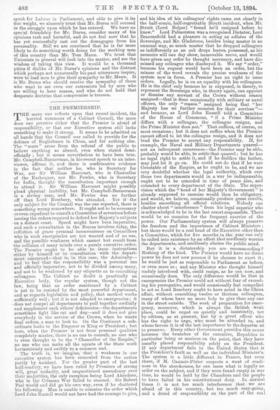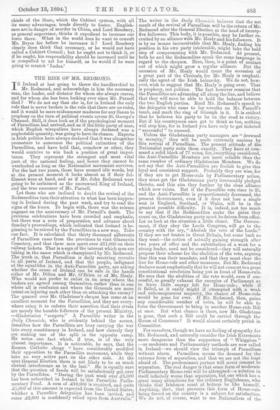THE PREMIERSHIP. T HE more one reflects upon that recent incident,
the hurried summons of a Cabinet Council, the more does one perceive either that the Premier is afraid of responsibility, or that our Executive system still lacks something to make it strong. It seems to be admitted on all hands that the Council was called to provide for the defence of Englishmen in China, and for nothing else. The " scare " arose from the refusal of the public to believe anything so absurd, even when stated demi- officially ; but it seems nevertheless to have been true. Mr. Campbell-Bannerman, in his recent speech to an inter- viewer, affirms it, and there is confirmative evidence in the fact that neither he, who is Secretary for War, nor Sir William Harcourt, who is Chancellor of the Exchequer, nor Mr. Fowler, who is Secretary for India, thought the consultation important enough to attend it. Sir William Harcourt might possibly plead physical inability, but Mr. Campbell-Bannerman is a strong man, and Mr. Fowler was no further off than Lord Rosebery, who attended. Yet if the only subject for the Council was the one reported, there is - something wrong somewhere. It ought not to be necessary - or even expedient to consult a Committee of seventeen before issuing the orders required to defend her Majesty's subjects - on a distant coast. Speed might have been imperative, and such a consultation in the Recess involves delay, the infliction of grave personal inconvenience on Councillors who in such emergencies are not wanted and of no use, and the possible weakness which cannot but result from the collision of many minds over a purely executive order. The Premier ought to be able to issue instructions either by himself or in consultation with the depart- ment concerned—that is, in this case, the Admiralty— and. to feel that the responsibility was a personal one and officially imperative, not to be divided among many, and not to be weakened by any etiquette as to consulting colleagues. The Cabinet no doubt is practically an Executive body, the regular system, though not the law, being that an order sanctioned by a Cabinet is not to be resisted by the most powerful department, and as regards legislation and policy, that method works sufficiently well ; but it is not adapted to emergencies ; it 'does not compel all departments to pull together cordially and supplement each others' deficiencies—the departments sometimes fight like cat and dog—and it does not give everybody in the service of the Crown, when he wants final orders, a man to look to. On the Continent a sub- ordinate looks to the Emperor or King or President ; but here, when the Premier is not from personal qualities completely master, there is no one to consult, no one who is even thought to be the " Chancellor of the Empire," no one who can make all the agents of the State work harmoniously and swiftly to a common end. The truth is, we imagine, that a weakness in our executive system has been concealed from the nation partly by accident. For the greater part of the last half-century, we have been ruled by Premiers of strong will, great audacity, and unquestioned ascendency over their majorities, the only exception being Lord Aberdeen, who in the Crimean War failed to succeed. Sir Robert Peel would and did go his own way, even if he shattered his following. Man is unable to conceive the order which Lord John Russell would not have had the courage to give, and his idea of his colleagues' rights came out clearly in the half-comic, half-regrettable Strutt incident, when Mr. Strutt (Lord Belper) " found he'd resigned before he knew." Lord Palmerston was a recognised Dictator, Lord Beaconsfield had a pleasure in acting as adlatus of the Sovereign, and Mr. Gladstone, besides being master in an unusual way, so much master that he dropped colleagues as indifferently as an oak drops leaves, possessed, s,13 his memoirs will one day show, immovable nerve, and would have given any order be thought necessary, and have die. missed any colleague who disobeyed it. We say " order," because his request would have been an order, but the misuse of the word reveals the precise weakness of the system now in force. A Premier has no right to issue orders, Legally, he is on an equality with his colleagues. He is the chief only because he is supposed, in theory, to represent the Sovereign who, in theory again, can appoint or dismiss any servant of the Crown without reason assigned—that is done occasionally with military or naval officers, the only "reason" assigned being that "her Majesty has no further occasion for their services "- and because, as Lord John Russell told a Committee of the House of Commons, " if a Prime Minister differs with a colleague, the colleague resigns, and the Prime Minister does not." That suffices, of course, on most occasions ; but it does not suffice when the Premier cannot afford to let the colleague resign, and it does not bind the Premier to accept any responsibility. If, for example, the Naval and Military Departments quarrel— not an infrequent occurrence—the Premier may be able, probably would be able, to settle that quarrel ; but he has no legal right to settle it, and if he dislikes the bother, may just let it go on. He could not do that if he were Constable of the Empire, as he ought to be, and we are very doubtful whether the legal authority, which over those two departments would in a war be indispensable, ought not to be conceded in time of peace also, and extended to every department of the State. The super- vision which the " head of her Majesty's Government " is already supposed to exercise would then be obligatory, and would, we believe, occasionally produce great results, besides smoothing all official relations. Nobody can chatter about " interference " from his legal superior who is acknowledged to be in the last resort responsible. There would be no occasion for the frequent exercise of the power. Our Parliamentary system will always preserve the freedom and the importance of Cabinet Ministers ; but there would be a real head of the Executive other than a Committee, which for five months in the year can only be called into existence by an effort that needlessly worries the departments, and needlessly alarms the public mind.
But it is a dictatorship you are recommending ? Nothing of the kind. The Premier would have no direct power be does not now possess if he chooses to exert it ; he would be just as responsible to Parliament as before, or even more so ; and any Minister who thought himself unduly interfered with, could resign, as he can now, and occasionally does. The only difference would be that in emergencies the Premier could act without fear of exceed- ing his prerogative, and would occasionally feel compelled to act as Lord Rosebery ought to have acted in the 'China affair, without consulting twelve or thirteen colleagues, many of whom have no more help to give than any one in the street outside. The work of preparation for emer- gency, moreover, which is always the British weak place, could be urged on quietly and insistently, not by editors, as at present, but by a great officer who has the right to urge, who must be attended to, and whose favour it is of the last importance to the departm. nt to preserve. Every other Government provides this nexus between the branches of the executive, Republics in particular being so anxious on the point, that they have usually placed responsibility solely on the President. If any department fails in the United States that is the President's fault as well as the individual Minister's. The system is a little different in France, but even. there, if M. Casimir-Ptirier suspects a want of readi- ness in the storehouses, he can issue what is legally an order on the subject, and if they were found empty in war time, he would be held by the Chambers and the people to have failed in his constitutional duty. In normal times it is not too much interference that we are afraid of in this country, but too much easy-going, and a dread of responsibility on the part of the real chiefs of the State, which the Cabinet system, with all its many advantages, tends directly to foster. English- men are in danger of murder in China, and Lord Rosebery, as general supervisor, thinks it expedient to increase our force there. What in the world does he want to consult Mr. Bryce for before he increases it ? Lord Rosebery clearly does think that necessary, or he would not have called a Cabinet Council ; but he ought not to think it, or if he ought, his responsibility should be increased until he is compelled to act for himself, as he would if he were going to scratch Ladas.'



















































 Previous page
Previous page